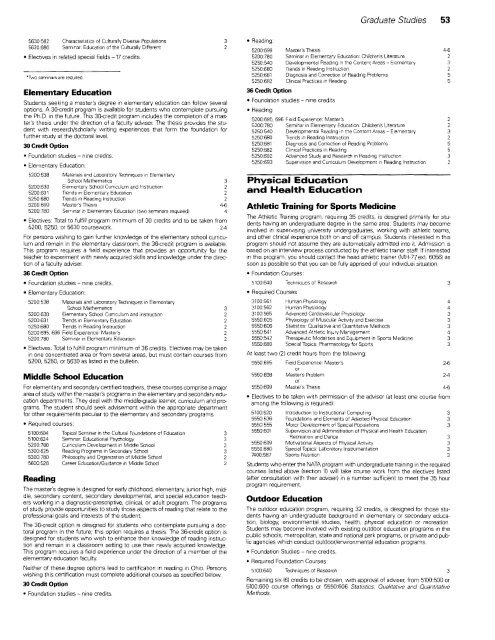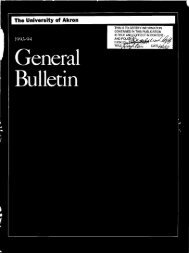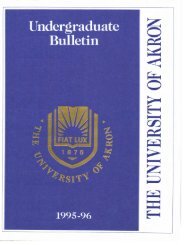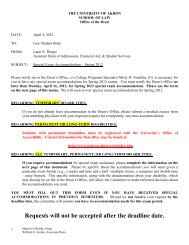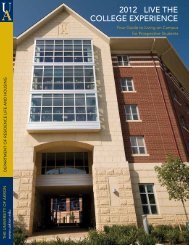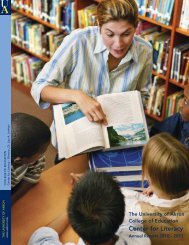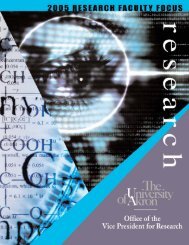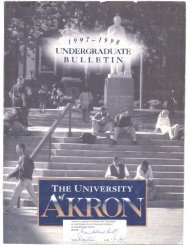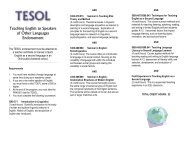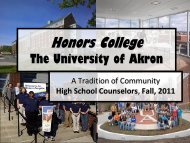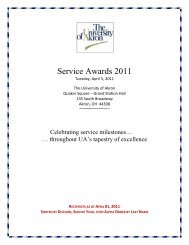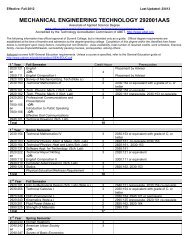Graduate School - The University of Akron
Graduate School - The University of Akron
Graduate School - The University of Akron
- No tags were found...
You also want an ePaper? Increase the reach of your titles
YUMPU automatically turns print PDFs into web optimized ePapers that Google loves.
<strong>Graduate</strong> Studies 535630:5825630:686Characteristics <strong>of</strong> Culturally Diverse PopulationsSemrnar: Education <strong>of</strong> the Culturally Different• Electives in related special fields -17 credits.*Two sem1nars are requiredElementary EducationStudents seeking a master's degree in elementary education can follow severaloptions. A 30-credit program is available for students who contemplate pursuingthe Ph.D. in the future. This 30-credit program includes the completion <strong>of</strong> a master'sthesis under the direction <strong>of</strong> a faculty adviser. <strong>The</strong> thesis provides the studentwith research/scholarly writing experiences that form the foundation forfurther study at the doctoral level.30 Credit Option• Foundation studies - nine credits.• Elementary Education:5200:538 Materials and Laboratory Techniques rn Elementary<strong>School</strong> Mathematics5200630 Elementary <strong>School</strong> Curriculum and Instruction5200631 Trends in Elementary Education5250680 Trends in Reading Instruction5200:699 Master's <strong>The</strong>srs5200:780 Seminar rn Elementary Educatron (two semrnars requrred)• Electives: Total to fulfill program minimum <strong>of</strong> 30 credits and to be taken from5200, 5250, or 5630 coursework. 2-4For persons wishing to gain further knowledge <strong>of</strong> the elementary school curriculumand remain in the elementary classroom, the 3Ekredit program is available.This program requires a field experience that provides an opportunity for theteacher to experiment with newly acquired skills and knowledge under the direction<strong>of</strong> a faculty adviser.36 Credit Option• Foundation studies - nine credits.• Elementary Education:5200:538 Matenals and Laboratory Techniques in Elementary<strong>School</strong> Mathematrcs5200:630 Elementary <strong>School</strong> Curriculum and lnstructron5200:631 Trends in Elementary Educatron5250:680 Trends rn Reading Instruction5200:695, 696 Field Experience: Master's5200:780 Seminar in Elementary Education• Electives: Total to fulfill program minimum <strong>of</strong> 36 credits. Electives may be takenin one concentrated area or from several areas, but must contain courses from5200, 5250, or 5630 as listed in the bulletin.Middle <strong>School</strong> EducationFor elementary and secondary certified teachers, these courses comprise a majorarea <strong>of</strong> study within the master's programs in the elementary and secondary educationdepartments. <strong>The</strong>y deal with the middle-grade learner. curriculum and programs.<strong>The</strong> student should seek advisement within the appropriate departmentfor other requirements peculiar to the elementary and secondary programs.• Required courses:5100:604 Toprcal Seminar in the Cultural Foundations <strong>of</strong> Education5100:624 Seminar: Educational Psychology5200:780 Currrculum Development in Middle <strong>School</strong>5300:625 Readrng Programs in Secondary <strong>School</strong>5300:780 Philosophy and Organrzation <strong>of</strong> Middle <strong>School</strong>5600:526 Career Educatron/Gurdance rn Middle <strong>School</strong>Reading<strong>The</strong> master's degree is designed for early childhood, elementary, junior high, middle,secondary content. secondary developmental, and special education teachersworking in a diagnostic-prescriptive, clinical, or adult program. <strong>The</strong> programs<strong>of</strong> study provide opportunities to study those aspects <strong>of</strong> reading that relate to thepr<strong>of</strong>essional goals and interests <strong>of</strong> the student.<strong>The</strong> 30-credit option is designed for students who contemplate pursuing a doctoralprogram in the future; this option requires a thesis. <strong>The</strong> 36-credit option isdesigned for students who wish to enhance their knowledge <strong>of</strong> reading instructionand remain in a classroom setting to use their newly acquired knowledge.This program requires a field experience under the direction <strong>of</strong> a member <strong>of</strong> theelementary education faculty.Neither <strong>of</strong> these degree options lead to certification in reading in Ohio. Personswishing this certification must complete additional courses as specified below.30 Credit Option• Foundation studies- nine credits.3232224-64322222332322• Reading:5200:699 Master's <strong>The</strong>sis5200:780 Seminar rn Elementary Education: Children's Literature5250:540 Developmental Reading rn the Content Areas- Elementary5250:680 Trends in Readrng Jnstructron5250:681 Diagnosrs and Correction <strong>of</strong> Reading Problems5250:682 Clinrcal Practices rn Readrng36 Credit Option• Foundation studies - nine credits• Reading5200:695, 696 Freid Experience: Master's5200:780 Seminar in Elementary Education: Children's Literature5250:540 Developmental Reading rn the Content Areas- Elementary5250:680 Trends rn Reading Instruction5250:681 Diagnosrs and Correction <strong>of</strong> Reading Problems5250:682 Clinical Practices in Readrng5250:692 Advanced Study and Research in Reading lnstructron5250:693 Supervision and Curriculum Development in Reading InstructionPhysical Educationand Health EducationAthletic Training for Sports Medicine<strong>The</strong> Athletic Training program, requiring 35 credits, is designed primarily for studentshaving an undergraduate degree ·In the same area. Students may becomeinvolved in supervising university undergraduates, working with athletic teams,and other clinical experience both on and <strong>of</strong>f campus. Students interested in thisprogram should not assume they are automatically admitted into it Admission 1sbased on an interview process conducted by the athletic trainer staff. If interestedin this program, you should contact the head athletic trainer (MH-77 ext. 6056) assoon as possible so that you can be fully apprised <strong>of</strong> your individual situation.• Foundation Courses:5100:640 Techniques <strong>of</strong> Research3• Required Courses3100:561 Human Physiology3100:562 Human Physiology3100:565 Advanced Cardrovascular Physrology5550:605 Physiology <strong>of</strong> Muscular Activity and Exercise5550:606 Statistics: Qualitative and Ouantrtatrve Methods5550:541 Advanced Athletrc Injury Management5550:542 <strong>The</strong>rapeutrc Modalitres and Equipment in Sports Medicine5550:680 Special Topics: Pharmacology for SportsAt least two (2) credit hours from the following:5550:695 Field Experrence: Master'sor5550:698 Master's Problemor5550:699 Master's <strong>The</strong>srs• Electives to be taken with permission <strong>of</strong> the adviser (at least one course fromamong the following is required):5100:520 lntroductron to Instructional Computrng5550:536 Foundations and Elements <strong>of</strong> Adapted Physrcal Education5550:555 Motor Development <strong>of</strong> Specral Populations5550:601 Supervision and Administration <strong>of</strong> Physical and Health Educatron,5550:6095550:6807400:587Recreatron and DanceMotivatronal Aspects <strong>of</strong> Physical ActrvrtySpecial Topics: Laboratory InstrumentationSports NutritionStudents who enter the NATA program with undergraduate training in the requiredcourses listed above (section II) will take course work from the electives listed(after consultation with their adviser) in a number sufficient to meet the 35 hourprogram requirement.Outdoor Education<strong>The</strong> outdoor education program, requiring 32 credits, is designed for those studentshaving an undergraduate background 1n elementary or secondary education,biology, environmental studies, health, physical education or recreation.Students may become involved with existing outdoor education programs in thepublic schools, metropolitan, state and national park programs, or private and publicagencies which conduct outdoor/environmental education programs.• Foundation Studies -nine credits.• Required Foundation Courses:5100:640 Technrques <strong>of</strong> Research 3Remaining six (6) credits to be chosen, with approval <strong>of</strong> adviser, from 5100:500 or5100:600 course <strong>of</strong>ferings or 5550:606 Statistics: Qualitative and QuantitativeMethods.4-62325522325532443334332-62-44-63333333


